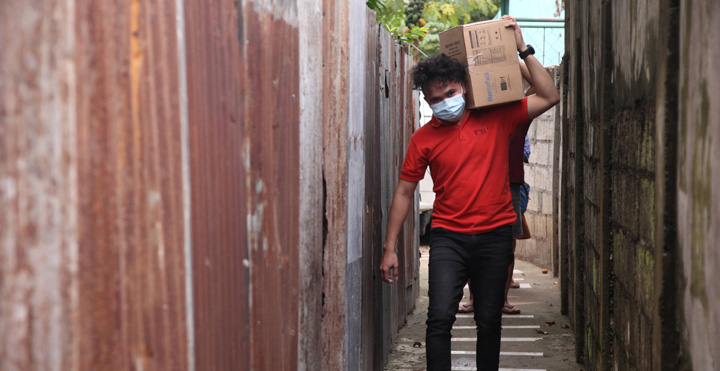International Care Ministries has been empowering families in the Visayas and Mindanao for decades. Through its Padayon campaign, it is pushing to help 50,000 more Filipinos through food deliveries, training, and seeds.
ALSO READ: Vaccine Diaries: Filipinos Share Experiences Getting Vaccinated Against COVID
A year into COVID-19, ultra poor families in the Philippines not only still feel the weight of the pandemic’s impact, it is getting heavier. According to a survey conducted by the International Care Ministries (ICM), 67 percent of poor families in the Visayas and Mindanao earned less than they did before the pandemic. It is a statistic that ICM wishes to make a dent on through its Padayon program.
Meaning “to carry on,” or “to keep going” in Cebuano, the word Padayon has become a battle cry for ICM as it aids Filipinos through these tough times. Founded by Sharon Pastre in 1992, the organization has been helping ultra poor families—those subsisting on just $0.50 a day—over 12 regional bases: Palawan, Kalibo, Iloilo, Bacolod, Dumaguete, Cebu, Bohol, Tacloban, Dipolog, Koronadal, General Santos, and Davao.
As a campaign, Padayon wants to empower 50,000 people to rebuild from the pandemic through a donation drive that runs until May 31.
Plugging gaps
More statistics from ICM’s Sentinel Survey, which is gleaned by its ground staff with the families they interact with, lays out the challenges the ultra-poor face.
Ten percent could not afford food, and 43 percent had to take on debts just to get by. Twenty-seven percent had to cut spending on their children’s education, the same percentage of families who cannot afford to pay their bills.
Working through its large networks of pastors and churches in the country, ICM has made over 12,500 deliveries of relief goods, reaching over a million families with over 14 million meals, and more than a million bars of soap.
“We’ve been impressed. Many agencies of the Philippine government have been acting heroically to help the poor,” says ICM CEO David Sutherland. “But in a country of more than 100 million people on 7,000+ islands, gaps are inevitable. That is where ICM comes in.”
Sutherland estimates that eight million poor people live in areas where ICM operates. “That means ICM has already distributed food to more than two-thirds of poor Filipino families across vast areas of the country,” he says.

More than relief
Late last year, ICM’s surveys revealed that 11 percent of families were eating less than normal, and around four percent were forced to cut the size of children’s meals due to lack of available food. The organization, however, doesn’t just want to feed people, it wants to lay down something more sustainable.
For example, ICM includes seeds in their donations so that families can grow their own food in their backyards. So far, 300 million vegetable seeds have been donated which have been helpful especially since movement have been severely limited in the past year.
Training and development is also another priority for ICM, which it fulfills through its Renew program. Through this, they teach families everything from business to financial literacy.
One such person is Consuelo, whose community savings group used to sell soap pre-pandemic, but had to stop when lockdowns were imposed. The Cebuana received Renew training as well an ICM grant to relaunch her community’s business, which now sells rice. “I’m thankful to receive help from you the second time!” she says. “My hope in God and hope for the future of my family has been restored.”
For more information on ICM’s research and programs, visit Caremin.com.





